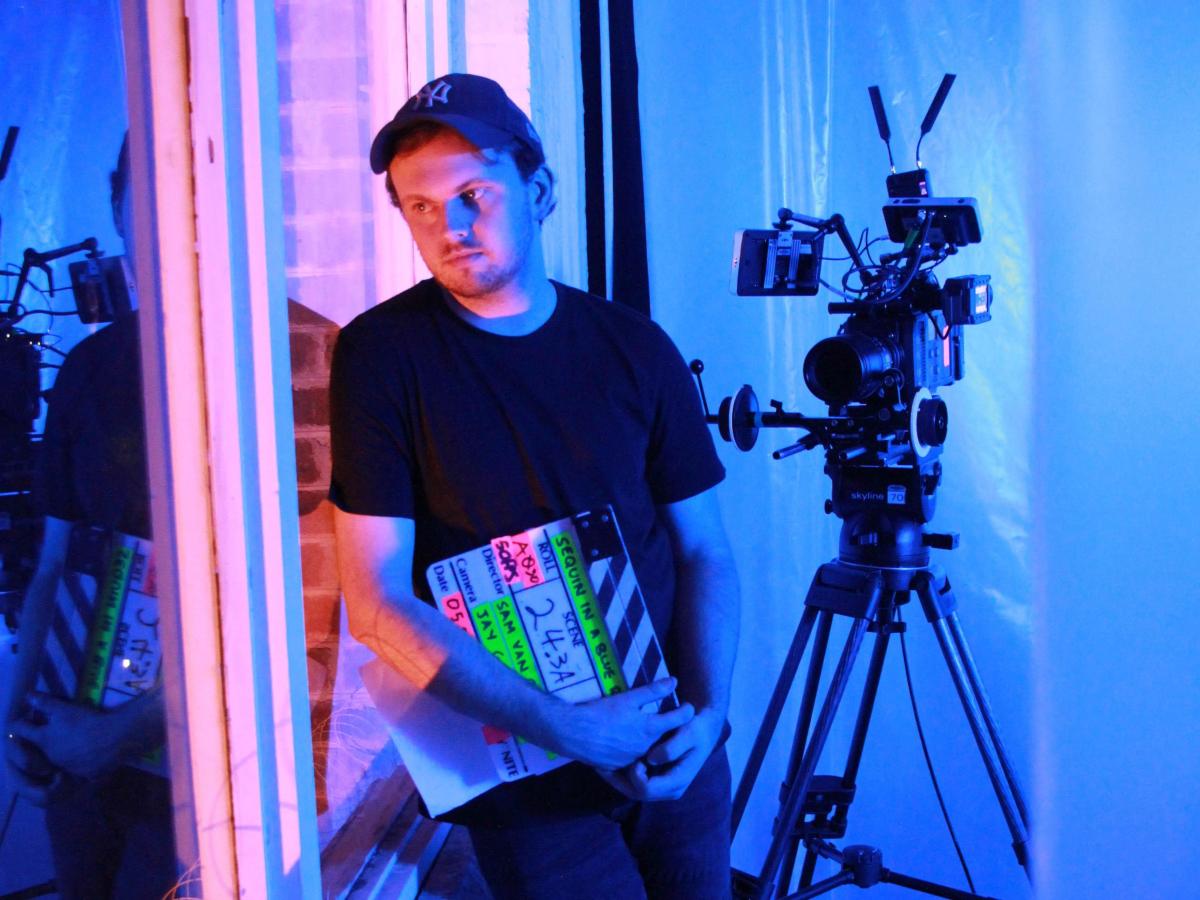Photo credit: Louise Dietz Henderson
Change is a constant in the screen sector. New ways of creating and distributing are always opening up, and with this new technology comes new voices and new perspectives.
‘We’re seeing a huge explosion of authentic and unheard voices. We can see that on Netflix, on HBO, we can see it in some of the biggest possible successes right now,’ filmmaker and AFTRS Master of Arts Screen graduate Samuel Van Grinsven told Artshub.
‘AFTRS knows the industry thirst for that, but they also know that’s how the best work is made – when a director or writer is expressing a story that they have an authentic connection to.’
Since its establishment in 1973, AFTRS has played a vital role in the Australian film and television industries, helping to foster individual talent and keep the sector up with the latest advances in technology.
For Van Grinsven, that meant the ability to make his debut feature film Sequins in a Blue Room – which recently won the Audience Award for Best Narrative Feature at Sydney Film Festival, had its international premiere at Outfest in Los Angeles and will be showing at the Melbourne International Film Festival next month – using industry standard equipment.
‘We knew that we’d able to pull off something that looked professional, that didn’t look like a student film, because we were using the same resources that the industry was using.’
The importance of connecting to industry
A major focus at AFTRS is connecting students with the wider industry. Networking is a vital part of succeeding in the media, and it’s essential for students to hear from people who are working at the coalface of Australia’s media. At AFTRS, students are given hands-on experience through internships, work placements, and working on live briefs, alongside receiving feedback from industry professionals.
‘I think the school’s gone through a period where it’s really opened itself back up to the industry,” says Van Grinsven. ‘You’re getting direct industry feedback constantly throughout the course, which prepares you for when you finally leave the school.’
Global media is currently in a state of flux, and if Australia’s going to remain a serious player on the world stage it’s essential that schools like AFTRS empower students to carry Australian stories out to a wider audience.
‘The films that are starting to come out of AFTRS now are really showing parts of the Australian community that don’t make it to the screen enough, or haven’t in the past, whether it’s queer voices or Indigenous voices or more films being written and directed by women.’
With new voices come new challenges. Students from migrant or Indigenous backgrounds may be under financial pressures or come from across Australia. Increasingly AFTRS is designing its courses to fit their requirements, and there’s now a wide range of scholarships being offered to help students manage course costs.
‘What they really focus on at AFTRS is authenticity, and a truthful, authentic voice in storytelling,’ says Van Grinsven. ‘And that’s more important now than it’s ever been.’
The hunt is on for Australia’s new generation of storytellers
Each August, AFTRS opens its doors to attract the next generation of Australian media storytellers.
The AFTRS Open Day on Saturday 10 August is a chance to meet AFTRS students and to engage with AFTRS lecturers.
It’s also an opportunity to learn more about the courses available in 2020. There’s the Master of Arts Screen (offered in 11 disciplines), the Bachelor of Arts Screen: Production, the Graduate Diploma in Radio, and a range of Industry Certificates as well as a number of industry and introductory short courses. Visitors will also get to see AFTRS state-of-the-art facilities in action and receive essential tips about putting together their applications.
‘Some of the people I’ve collaborated with are from overseas,’ says Van Grinsven, ‘and when they hear about what we have access to at AFTRS and the freedom of the courses there, they’ve been blown away. It’s easy to take it for granted, but it’s an incredible school and the fact it’s well resourced, well-funded, and draws in incredible talent that comes and teaches there is super important.’
Supporting a new wave of students
A number of scholarships are also on offer to students, including the Storytelling Scholarship to support the creation of Australian stories. This scholarship covers total course fees for one 2020 Bachelor of Arts Screen: Production or 2020 Master of Arts Screen student. The applicant will be selected on the basis of merit, and will be awarded to support a student’s study by covering their tuition fees for the duration of their course.
Other scholarships available to students include equity, Indigenous and a Virgin Australia scholarship for students outside NSW. There’s also the new ABC Selwyn Speight Scholarship to develop radio talent with a focus on diversity, for BA students, there’s the UNHCR Beddie Scholarship for a refugee intending to pursue a career in the creative industries, the Onbass Giant Steps Scholarship and the Audible Inspiring Voices Scholarship for Women to support an emerging female creative aspiring to produce compelling audio entertainment.
AFTRS Open Day is on Saturday 10 August, 10am – 3.30pm, at AFTRS, Entertainment Quarter, Moore Park, Sydney. Register here.
Registered visitors who attend Open Day go in the running to win a $500 short course voucher at AFTRS (valid for 12 months).
If you can’t make Open Day but want to watch the key sessions, AFTRS is live streaming the key sessions on their Facebook page.





